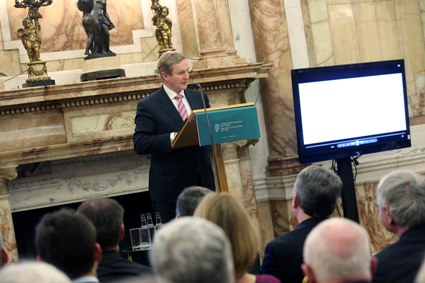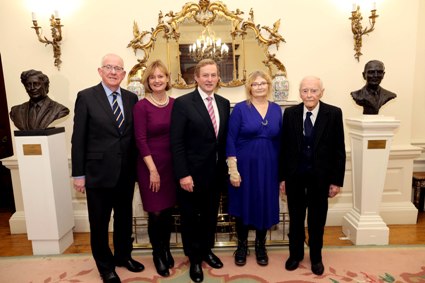
Taoiseach Enda Kenny tonight addressed a lecture hosted by Foreign Affairs Minister Charlie Flanagan at Iveagh House to mark 30 years since the Anglo-Irish Agreement.
The Taoiseach said
I welcome all those here who helped make that agreement happen, who implemented it and built on its foundations over subsequent decades in the pursuit of peace, reconciliation, stability and prosperity.
Tonight, we can all take time to reflect on this major milestone in the history of this island, relationships within it and with our neighbours in Britain. And to assess and survey the role the Anglo-Irish Agreement has played in shaping events of the last three decades.
My own view, which I hope many of you will share, is clear. This was truly a momentous document that has helped to transform British-Irish relations for the better, in every possible sense. All three key relationships – between the respective two communities in Northern Ireland, between North and South and between East and West – have benefited enormously from it.

(l to r) Minister Charlie Flanagan, Deirdre Clune, Taoiseach Enda Kenny, Mary Fitzgerald, daughter of Garret FitzGerald, Former Taoiseach Liam Cosgrave
The Taoiseach paid tribute to former Taoiseach Garret Fitzgerald:
Extraordinary times call for extraordinary people. And thankfully for Britain and Ireland, extraordinary people – on both sides of the Irish Sea – were in better supply than usual. In a word – leaders.
And none were more extraordinary than the late Dr. Garret FitzGerald. Returning to power as Taoiseach in December 1982, he knew that something profound was needed to steer Northern Ireland and British-Irish relations onto a better course.
The Taoiseach also paid tribute to the British Government's role in the Agreement:
The British Government and its diplomats and officials deserve great credit too in helping to bring about the discussions that led up to the Anglo-Irish Agreement. Margaret Thatcher’s legacy may be the source of endless debate both here in Ireland and in Britain. What is clear is that she was determined, in her own words, “to do something about Ireland”, when she was returned to Government in 1983.
So there was a meeting of minds in that something had to be done, though both sides were pragmatic and realistic too in their outlook. They knew that the conflict was not going to be solved by this Agreement alone. And they appreciated that only modest gains might be the initial award.
While they shared realistic expectations, Ireland and the UK approached the prospect of an Agreement from very different perspectives.
The Taoiseach noted the signficant role Ireland's membership of the EEC played:
There was another key force though at play in helping the Agreement come about. That force was – and still is – our joint membership of the European Union, or the European Economic Community as it was back then.
Joining the European Economic Community together in 1973 marked a new and important stage in the British-Irish relationship.
It helped to consign to history any notions that Ireland was somehow subordinate to the UK. We were now partners, and important allies, in a wider, new European project.
This reality helped create a new parity of esteem between our countries that was a critical factor in the balanced dynamic of the Anglo-Irish Agreement negotiations.
Acknowledging the difficult years that followed signature of the Agreement, the Taoiseach said :
We must acknowledge too that the Agreement was no panacea for all the North’s ills. Violence actually increased in the immediate aftermath of its signature.
But to focus on perceived failings would be to miss the point. For this was never intended as a comprehensive, conflict-ending settlement, as I said myself in that Dáil debate 30 years ago.
That level of ambition was beyond the scope of what could be achieved in 1985 – a reality fully grasped by authors on both sides. Incremental steps, such as those provided by the Agreement, were needed before any effort could be made at a more ambitious solution.
No, the Agreement’s true worth and contribution is better assessed with its contribution to 30 years of subsequent peace-making more squarely in mind.
The Taoiseach noted ongoing talks in Stormont:
As we meet tonight, negotiations on the most recent Agreement, the Stormont House Agreement, are continuing. We have had some difficult months recently in the North. I remain optimistic. But we need to move on from crisis negotiation after crisis negotiation.
When I addressed the British Irish Association in Cambridge in September, I set out a challenge. It is a vision for an island which is defined by optimism, hope and opportunity.
The Taoiseach concluded by commenting that today's situation is " not perfect but it is immeasurably better than 30 years ago. This is a world that was made possible by the people who negotiated the Anglo Irish Agreement."
Read the full speech here.